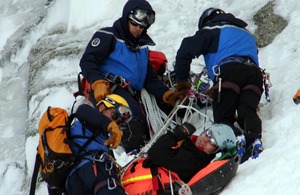Skiers: avoid injury and expensive medical bills
We urge winter sports holidaymakers to know their limits before hitting the slopes.

A winter sports rescue
We are launching a campaign aimed at Britons visiting European winter sports resorts this winter to explain the dangers of attempting slopes beyond your level of ability, or going off piste without the correct safety equipment.
If you’re heading off on a ski or snowboarding holiday this winter, please don’t put yourself at risk by trying to keep up with more experienced members of your party. The number of reported accidents on French slopes in 2012 was high, including seven deaths out of 12 serious incidents*.
Research
According to new research from the FCO**, of those British nationals that go on winter sports holidays the majority class themselves as beginner or intermediate. Only 1% of respondents classed themselves as expert.
Nearly two thirds (65%) of winter sports travellers admitted they would ski or snowboard on slopes above their experience in order to stay with a group. More than half (53%) also said they would follow a group of mates off piste.
Seventy per cent admitted they do not always wear a helmet when skiing or snowboarding, and one in five (21%) said they wouldn’t wear a helmet if others in their group weren’t.
Simon Taylor, Consul, based in Marseille, said:
Last year we saw a high number of British nationals end up in hospital with serious injuries. Sadly this included a number of deaths. Many of these accidents can be prevented by taking simple precautionary steps.
Don’t make the mistake of assuming you’ll be fine if you’re with more experienced skiers or snowboarders. It is significant that a large number of cases we have dealt with have involved off piste skiing.
Those lucky enough to survive an accident and end up in hospital can face months of recovery, so it is important to think carefully beforehand about the very real risks out there.
Insurance
Over a third (38%) of winter sports holidaymakers admitted that they don’t always take out travel insurance. One in three (31%) also said they don’t always check their policy to ensure they are covered for winter sports activities.
Simon Taylor continued:
Many people will be unaware that failing to wear a helmet or skiing off piste can invalidate some insurance policies, so if something does go wrong you could end up with hefty medical bills. In many cases family members then have to help with funds which can put a huge strain on families.
The FCO cannot pay for hospital treatment or for medical repatriation back to the UK, which is why it is so important to check your insurance covers you for everything you want to do.
Top tips to stay safe on the slopes
- Take out insurance – and check what it covers. It might not cover off piste skiing unless you are with a qualified guide.
- Have a check-up before you ski - one of the major causes of hospitalisation and death on the slopes is heart attacks.
- Don’t drink and ski. Alcohol can affect you more quickly at high altitudes and dangerously limits your awareness of risk and cold.
- Most skiing injuries are caused by collisions with other skiers – watch your speed and distance.
- Don’t attempt slopes you’re not experienced or fit enough to tackle.
- If you want to go off piste, go with a qualified guide.
- If going off piste carry a shovel, a probe and a transceiver in case of an avalanche. Also remember that you need proper training on how to use a transceiver.
- If you are going out on a glacier, you must wear a harness. If you fall into a crevasse, this will help the rescue team get you out.
- Make sure someone knows where you’re going and tell them of any changes to your plans.
- Only go off piste skiing or climbing with someone you have met previously and can trust. You need to know his/her capabilities, what you’ll be doing and where.
For further tips and advice on preparing for travel abroad, visit www.fco.gov.uk/travel
*Figures taken from FCO 2011/12 consular assistance data
**Survey conducted by ICM. Total sample size was 2,023 UK adults aged 18 and over. Fieldwork was undertaken in November 2012. The figures have been weighted and are representative of all UK adults aged 18 and over.
Notes to editors
You need a European Health Insurance Card (EHIC) before you travel – it gives the holder rights to healthcare that becomes necessary during a temporary visit to EEA (European Economic Area) countries or Switzerland. The EHIC replaced the E111 form in Jan 2006. The E111 form is no longer valid. People who are normally resident in the UK can apply for an EHIC. The FCO website explains what the EHIC covers.
The FCO’s Know Before You Go campaign encourages British nationals to prepare for their foreign travel so they can avoid preventable problems. The campaign targets a number of audiences, from gap year students to package holidaymakers; sports fans to older travellers and people visiting friends and family abroad. The campaign works with around 400 travel industry partners to communicate its messages.
In 2011/12 the FCO provided consular assistance to 19,874 British Nationals abroad, 3,739 of these cases involved the hospitalisation of a British national. Further details can be found in the British Behaviour Abroad Report 2012.